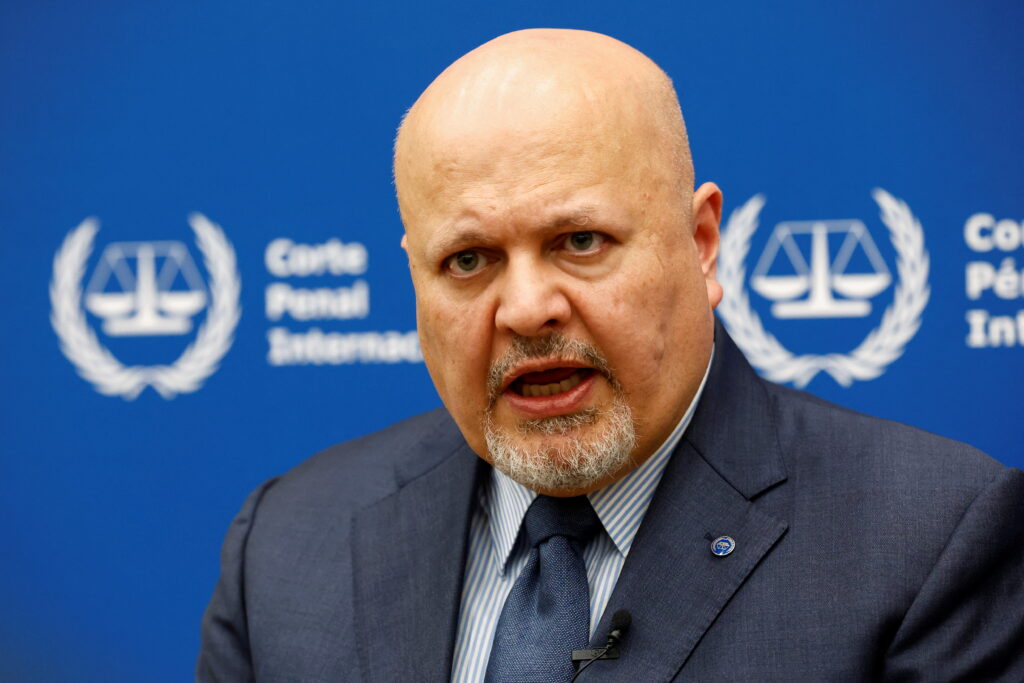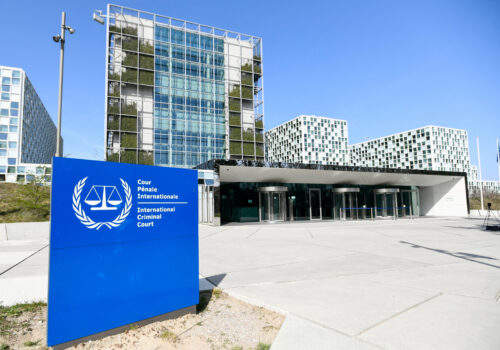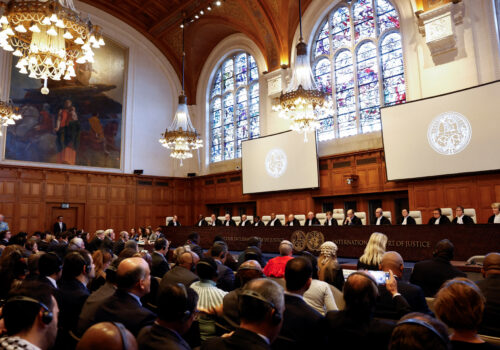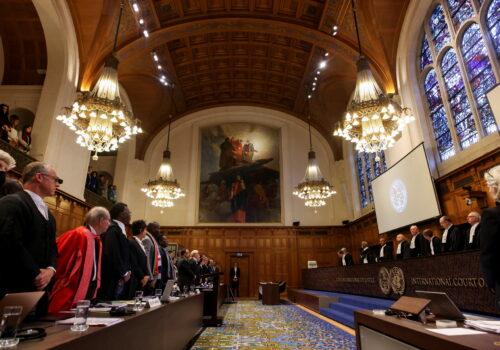The war came first—the warrants might come later. On Monday, International Criminal Court (ICC) Prosecutor Karim A.A. Khan applied for arrest warrants for Hamas chief Yahya Sinwar and Israeli Prime Minister Benjamin Netanyahu. Two other Hamas leaders and the Israeli defense minister were also named in the warrant application. Khan says that they bear responsibility for war crimes and crimes against humanity stemming from Hamas’s brutal attack on Israel on October 7, 2023, and Israel’s war in Gaza that followed. Next, a pretrial chamber of the ICC will review Khan’s request and determine whether to issue the arrest warrants. Below, Atlantic Council experts offer their verdict on the application and its implications.
Click to jump to an expert analysis:
Jonathan Panikoff: The prosecutor made a strategic and moral mistake
Elise Baker: Israel’s expected challenges to the warrant applications are likely to fail
Haydee Dijkstal: Here’s what to expect with the court’s timeline and Israel’s challenge
Thomas S. Warrick: The ICC is about to change the future of the Palestinian movement—unpredictably
The historic warrant application raises difficult diplomatic questions for Israel and its supporters
Today’s public announcement that the ICC’s Office of the Prosecutor (OTP) has applied for arrest warrants against Israeli officials and Hamas leaders followed through on expectations but also carried some surprises.
As to be expected, the chief prosecutor did not confine himself to charges against only one party to the conflict. The ICC’s territorial jurisdiction over what it recognizes as the State of Palestine means that both Palestinian and Israeli actors are fair game for indictment. Given the political sensitivities of the issues and the scope of the violations committed by all parties, there was little chance that the prosecutor would limit charges to any one “side.”
Also as expected, neither genocide nor apartheid are among the charges. Despite reference to these crimes featuring heavily in global solidarity chants and in advocacy for the rights of Palestinians, both crimes require distinct elements that go beyond the showing needed for other crimes under Articles 7 and 8 of the ICC’s Rome Statute. The prosecutor charged Netanyahu and Israeli Defense Minister Yoav Gallant with crimes including the war crime of starvation, which investigators do not need physical access to the Gaza Strip to prove given the extensive cross-border activity and accounts of international organizations operating on the ground that signal this crime. The charges against Sinwar, as well as other Hamas leaders Mohammed Deif and Ismail Haniyeh, also follow an uncontroversial reading of Hamas atrocities that were brutally captured on video for the world to see.
The application for warrants is historic in that it is the first time the OTP has brought charges against a head of state who is supported by Western nations. This move comes even after overt threats to the chief prosecutor, including by twelve US senators, to not press ahead with indictments against Israeli officials. Should the arrest warrants be approved, some tricky diplomatic questions may ensue. European countries are among some of the staunchest supporters of the court, and they are also countries to which Netanyahu and Gallant are likely to travel in the future. As ICC member states, those countries in Europe would have an obligation to turn Netanyahu and Gallant over to the court, should either of the two come within their borders. To avoid that quandary, the more likely outcome will be severe restrictions on the ability of Netanyahu and Gallant to travel.
At a time when Israel is seeking to shore up support among allies for its ongoing military actions, the arrest warrants, if they are issued, may further isolate Israel globally and accelerate the growing push for Netanyahu to leave office.
—Gissou Nia is the director of the Strategic Litigation Project at the Atlantic Council. She previously worked on crimes against humanity cases before the International Criminal Court and is counsel on submissions to the ICC Office of the Prosecutor.
The prosecutor made a strategic and moral mistake
The decision by the ICC prosecutor to seek arrest warrants for Netanyahu and Gallant is both a strategic mistake and a moral one.
The decision to seek the warrant elevates Netanyahu and may aid his domestic position as Israelis, who have long been critical of the ICC across the political spectrum and are even more so now, will rally around the flag. Netanyahu is likely to use this announcement to claim that he is being persecuted for defending Israel, an argument likely to resonate with the broader Israeli public. This domestic reaction might even provide him greater freedom of action in his decision making, including to engage in additional military operations in Gaza, ultimately extending the conflict.
The decision by Khan—who was clearly seeking to demonstrate balance in requesting arrest warrants for both Israeli and Hamas leaders—actually serves to erode the moral authority of the ICC by equating Israel, a flawed democracy, with Hamas, a terrorist group whose singular overriding aim is to obliterate the state of Israel. The implied false symmetry, as the Federal Chancellor of Austria Karl Nehammer wrote on X on Monday, is “non comprehensible.”
Netanyahu has made countless mistakes related to his prosecution of the war, led by his lack of a meaningful strategy for the day after—something Gallant ironically just called Natanyahu out for last week. The mass humanitarian tragedy that continues to unfold in Gaza is not debatable. But there is a critical and meaningful difference between poor execution of strategy and tactics, on one hand, and “causing extermination . . . starvation . . . denial of humanitarian relief . . . and deliberately targeting civilians in conflict,” on the other.
This has never been the Israeli strategy or goal. And while it’s understandable that some observers might be confused by Israeli ultranationalists who are part of the coalition government, such as Itamar Ben-Gvir and Bezalel Smotrich, making remarks that would seemingly support some of the crimes Khan alleges, their views are not the government’s views, let alone Netanyahu and Gallant’s. While seeking to charge Netanyahu and Gallant may garner the support of certain countries and activists, it risks leading to the ICC’s own erosion of moral authority.
—Jonathan Panikoff is the director of the Atlantic Council’s Scowcroft Middle East Security Initiative. He is a former deputy national intelligence officer for the Near East at the US National Intelligence Council.
Israel’s expected challenges to the warrant applications are likely to fail
Today’s applications for arrest warrants are the first step for the ICC to hold accountable both the Hamas and Israeli leaders who have perpetrated war crimes and crimes against humanity since October 7. The next step is for a pretrial chamber to approve the arrest warrants. With a mountain of evidence backing the charges against leaders on both sides of the conflict, there is no reason to suspect the applications will fail.
Israel may challenge the charges against its officials, but the two most likely challenges will probably fail.
First, any arguments that the ICC lacks jurisdiction over Israeli leaders are simply wrong. The pretrial chamber has already settled that the court has jurisdiction over crimes committed either by Palestinian nationals or on the territory of the ICC-recognized State of Palestine—including crimes committed by Israelis in Gaza. The fact that Israel is not a member state of the ICC poses no issue. Just as the United States and other countries supported the ICC’s arrest warrant against Russian President Vladimir Putin—a national and head of a non-ICC member state—they too should support any arrest warrants against Israeli leaders.
Second, any claims that the principle of complementarity bars arrest warrants for Israeli leaders are similarly unfounded. There is no indication of any Israeli effort to investigate or prosecute Netanyahu and Gallant for their roles in war crimes and crimes against humanity in Gaza. Without any domestic accountability efforts for the same individuals and criminal charges, the ICC can proceed with its case.
If and when arrest warrants are issued, all ICC member states must comply with an order to arrest and surrender to the court any wanted person who is found on their territory. Failure to do so will undermine accountability and international justice globally.
—Elise Baker is a senior staff lawyer for the Strategic Litigation Project.
Here’s what to expect with the court’s timeline and Israel’s judicial challenge
Today’s news of the ICC prosecution’s application for arrest warrants represents a significant step for many victims who view the ICC as a court of last resort and who have held hope for justice before the ICC—starting as far back as 2009, when the minister of justice for the Government of Palestine attempted to lodge an Article 12(3) declaration and refer the situation to the Court. With news of mounting external pressure on the ICC’s OTP and threats against prosecution staff and their families if warrants were to be pursued, it is of the utmost importance that the rule of law and the independence of the ICC is respected and all parties and organs of the court can work free of influence or pressure. This is especially important now that the decision on whether to issue the requested warrants is with the pretrial chamber.
There is no set time frame in which the pretrial chamber must make its decision on the prosecution’s application. The pretrial chamber will need to review the evidence submitted by the prosecution against the charges sought, but the chamber has previously acted with expediency to issue decisions granting arrest warrants within about a month. For example, the warrants against Putin and Russian official Maria Alekseyevna Lvova-Belova were issued in about a month’s time. So, too, were warrants against Russian military commanders Sergei Kobylash and Viktor Sokolov. Warrants against other heads of state were also issued in a similar time frame, including against Libyan leader Muammar al-Qaddafi and Ivorian President Laurent Gbagbo.
If the pretrial chamber decides to grant the prosecution’s request for arrest warrants, focus will shift to the principle of complementarity and the process for challenging the admissibility of the cases before the ICC. As mentioned by the prosecutor in his statement today, the principle of complementarity allows the ICC to defer a case to the national authorities only if there is an independent and impartial judicial process in place to show that the state is “willing and able” to conduct the case instead of the ICC.
However, attention should also be paid to the ICC’s prior case law on this standard and particularly to the high threshold imposed when Kenya attempted to challenge the admissibility of the post-election violation cases against six Kenyan officials. Here, the ICC found that a state must demonstrate that it is not only “willing and able” to conduct the case, but that there are active steps being taken by the state to investigate the same persons named by the ICC and for the same conduct as reflected in the crimes within the ICC warrant. This would mean that, for example, should Israel decide to challenge the warrants’ admissibility (if issued), it would need to submit tangible proof that there is an open and active investigation in Israel against Netanyahu and Gallant for the same underlying conduct of the crimes charged by the ICC.
—Haydee Dijkstal is a nonresident senior fellow with the Strategic Litigation Project at the Atlantic Council and a practicing attorney in international criminal law and international human rights law. She is currently representing victims at the ICC in the situation in Afghanistan and the situation in Ukraine.
The ICC is about to change the future of the Palestinian movement—unpredictably
One prediction I am confident in making: The ICC prosecutor’s efforts to get arrest warrants for three Hamas and two Israeli officials are not going to go the way most people expect.
Consider the arrest warrants sought for Hamas’s two top military commanders, Sinwar and Deif, and its political leader, Haniyeh. Because the ICC considers Palestine a state party, this obligates the Palestinian Authority to arrange the three Hamas leaders’ appearance in The Hague. No one expects this to happen anytime soon, if ever. More importantly, an arrest warrant will make it hard for those Palestinians and others who think that one key to lasting peace and a two-state solution is to bring Hamas together with Fatah into a reunited Palestinian movement. The prosecutor’s application for arrest warrants is likely to highlight the fact that everything that Hamas did on October 7, and every day that Hamas holds hostages, is a war crime and part of a campaign of crimes against humanity.
Hamas’s backers are likely to say that Israel’s refusal to recognize the ICC’s jurisdiction excuses Palestinians from turning Hamas officials over to The Hague. But such a claim quickly falls apart. International law is based on the principle of state consent. Israel is not a party to the ICC treaty and does not recognize the ICC as having any authority over Israeli officials. Palestinian officials cannot claim this. The basis for the ICC’s jurisdiction is that Palestine is a state party—without that, the case goes away.
If arrest warrants are issued, they will have an uncertain effect on whether, if, and how (or how not) Hamas and its supporters, who are determined to destroy the state of Israel, become integrated into the Palestinian movement. This is but one reason why this case is not going to go the way most people expect.
—Thomas S. Warrick is a nonresident senior fellow and the Scowcroft Middle East Security Initiative at the Atlantic Council. He previously served in the US State Department as deputy in the Office of the Secretary/Office of War Crimes Issues, among other roles.
Further reading
Mon, May 6, 2024
Seven questions (and answers) if the ICC issues arrest warrants for Israeli officials
New Atlanticist By Mark Klamberg
Israel’s government has voiced its concern in recent days that the International Criminal Court will soon issue arrest warrants for Israeli officials in connection with the war in Gaza.
Fri, Jan 26, 2024
Experts react: What the International Court of Justice said (and didn’t say) in the genocide case against Israel
New Atlanticist By
South Africa asked the court to order an immediate cease-fire. Israel asked the court to throw out the case. Atlantic Council experts explain what the court did instead.
Fri, Feb 16, 2024
Could the US and other states be implicated in South Africa’s genocide case against Israel?
New Atlanticist By Celeste Kmiotek
The International Court of Justice case could inspire proceedings against other states for complicity in or failure to prevent genocide.
Image: International Criminal Court Prosecutor Karim Khan speaks during an interview with Reuters in The Hague, Netherlands February 12, 2024. REUTERS/Piroschka van de Wouw



